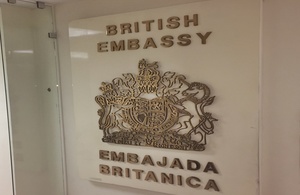UK sanctions Honduran Congressman under new global anti-corruption regime
World news story
The UK Government designated today Honduran Congressman Oscar Ramón Nájera due to his involvement in significant corruption.

In his official capacity, Oscar Ramón Nájera facilitated bribes with public officials that supported a major drug trafficking organisation, ‘Los Cachiros’. Conduct of this nature seriously undermines the rule of law and trust in public institutions in Honduras. Sanctions include assets freeze and travel ban.
This designation is made under the UK’s Global Anti-Corruption Sanctions Regulations 2021, launched today and put in place to prevent and combat serious corruption. The Global Anti-Corruption Sanctions Regulations 2021 is secondary legislation laid under the Sanctions and Anti-Money Laundering Act 2018. These regulations have replaced the EU’s sanctions system.
The Sanctions and Anti-Money Laundering act 2018 provides that, in cases where the Secretary of Foreign Affairs has credible information officials of foreign governments have been involved in significant corruption, those involved in serious acts of corruption, such as Oscar Ramón Nájera, are prevented from entering the UK, as well as stopping their assets from being able to be dealt with in the UK.
Today’s actions support UK public security interests and sends out a strong political message that the UK considers this conduct unacceptable. The Global Anti-Corruption Sanctions regime targets individuals, not countries. The UK currently has no other sanctions targeting Honduran nationals.
These measures are being taken partly in tandem with the US, which is today also announcing further corruption sanctions. Acting together sends the clearest possible signal that corruption comes with a heavy price.
We continue to support initiatives that align with our own values of democracy, the respect for human rights and the rule of law. We will continue working with Honduras to strengthen our bilateral economic relationship, and dealing with other top priority issues, such as tackling climate change and keep promoting good governance.
Published 26 April 2021
